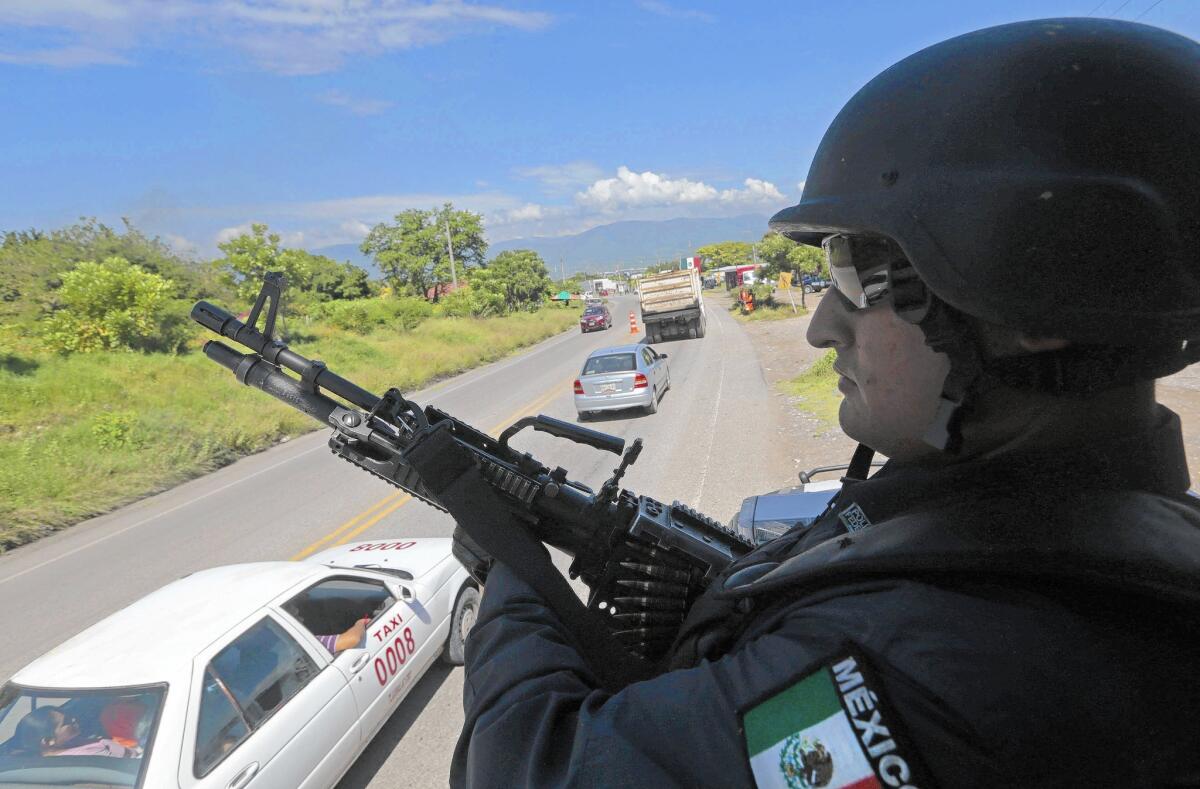Mexico deploys federal forces to missing students’ city

- Share via
Reporting from Iguala, Mexico — Militarized police patrolled this violent city Tuesday after the entire local police force was relieved of duty, with some members implicated in the disappearance and possible massacre of 43 university students.
“We’re looking for halcones” — lookouts working for the drug gangs — said a well-armed officer with the gendarmerie, Mexico’s new specialized law enforcement agency, as he staked out corners of a downtown park. “It is hard to find them because they blend into the population.” He did not give his name, citing security reasons.
The federal government dispatched the gendarmerie to Iguala, in Guerrero state, late Monday in a joint operation with the army, in an attempt to quell rising tension over the students’ disappearance and the subsequent discovery of hidden mass graves.
Authorities recovered 28 bodies from the makeshift graves on the outskirts of Iguala, in rugged, brush-covered terrain accessible only along rock-and-dirt paths. They are attempting to identify the bodies, many of them burned, and determine whether they are those of the students, most of whom were in their late teens or early 20s and came from poor, rural families.
The mayor of Iguala, Jose Luis Abarca, was forced to take a leave of absence and then disappeared. He is wanted for questioning. Officials of his Democratic Revolution Party, or PRD, said the ties of his wife’s family to the Beltran Leyva cartel have long been known to Guerrero Gov. Angel Aguirre and other authorities.
Two of the wife’s slain brothers were lieutenants for the cartel, their mother, Leonor Villa, said in a video that circulated Tuesday.
PRD official Rene Bejarano said he blamed state and federal authorities for ignoring Guerrero, a poor, mountainous state with a turbulent social and political history. “I think they never calculated the effect of letting these groups grow, that act with such violence, savagery and barbarity,” he said.
The students who went missing Sept. 26-27 — originally a group of more than 50, but some escaped — attended a special form of rural college in the nearby town of Ayotzinapa that trains teachers and is also known for radical left-wing political activity.
They apparently had commandeered buses and gone to Iguala, where they were confronted by police, who opened fire. Six people were killed, including a 15-year-old soccer player who happened on the scene.
Afterward, 43 students could not be accounted for.
Authorities say the Iguala police force is beset by drug-gang infiltration. Twenty-two officers have been arrested; two people have confessed to killing a number of students, Guerrero prosecutor Inaky Blanco said.
The students already had a contentious relationship with Iguala police and some residents. In a demonstration last year, they damaged City Hall, said Sergio Fajardo, owner of a local radio station. “For me, at that point, they stop being students and are vandals,” he said.
Iguala remained tense Tuesday, but the presence of hundreds of federal police officers and gendarmes was welcomed by some residents.
“This gives us some hope, but they will really have to clean up, like a cancer, removing criminals from the roots,” said Cecilia Zuniga, 63, who was teaching embroidery to other women under trees in the patio of City Hall.
“Everyone robs: the transit department, the taxi drivers, the police,” said Tomas Carranza, a retired teacher, as he waited in line for subsidized milk distributed by the city. “We have had a lot of impunity and zero government.”
Meanwhile, pressure mounted on Aguirre, the governor, to resign, which would make him the most prominent political casualty in an atrocity that may have even greater repercussions.
Aguirre struck a defiant note in a brief news conference Monday evening when asked by a reporter whether he would step down.
“Let them investigate me all they want,” he said. “I’ve said it and I say it again, I have nothing to be ashamed of. I have never stained my hands with blood.”
Aguirre formerly was with the Institutional Revolutionary Party, which holds the presidency, but switched to the leftist PRD.
Even some of his party compatriots, however, are abandoning him.
“The government of Guerrero must be held accountable and … punish the guilty,” Sen. Alejandro Encinas, also of the PRD, said in an opinion piece in El Universal newspaper, “and the PRD leadership must abandon [policies] that have permitted that ambition for money and for control of the party to open the door to delinquents.”
More to Read
Sign up for Essential California
The most important California stories and recommendations in your inbox every morning.
You may occasionally receive promotional content from the Los Angeles Times.











